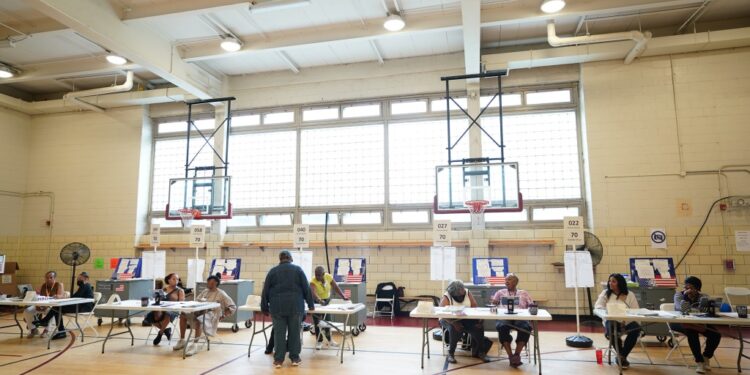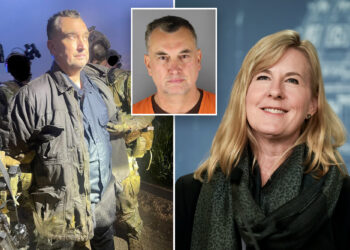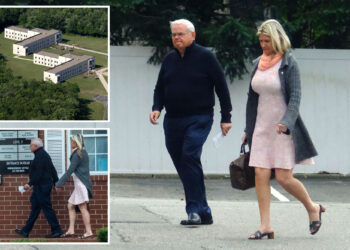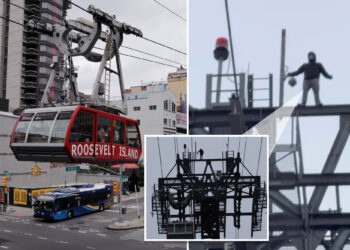In this week’s City Council races, the people of New York resoundingly spoke — and what they said, largely, was that they don’t care about off-year City Council races.
Maybe they should care.
Turnout was abysmal, at 3% of active voters.
The people don’t seem to know what they want, except for one thing: The most committed voters in districts that voted Adams into office two years ago aren’t thrilled with how things are going.
The most disheartening result was in one of the highest-profile races, Lower Manhattan.
Incumbent lefty Chris Marte coasted to victory, with 64% of the vote; 87% of active Democratic voters stayed home.
Four e-bike battery deaths, a recent stabbing death in Washington Square Park and a recent fatal Lower East Side shooting, all in the week before the election, didn’t spur people to vote for either of the two moderates running.
If the people in Manhattan below Houston Street are on the verge of revolt against higher crime and lower quality of life, they didn’t demonstrate it in this race.
From the perspective of Mayor Eric Adams, though, the fact that the people in Lower Manhattan are beyond complacent when it comes to whether New York is getting worse or better is hardly comforting.

Yet these aren’t the voters he needs.
In the 2021 mayoral primary, Lower Manhattan split its vote almost entirely between Kathryn Garcia and Andrew Yang.
That’s not the case in two districts where voters did vote decisively for change.
The 13% of Central Harlem Democrats who came out Tuesday rejected the status quo.
They had two long-time local pols to choose between, most notably Assemblywoman Inez Dickens, who once held the seat and whom Adams endorsed.

Instead, they chose newcomer Yusef Salaam, one of the five men who successfully had his conviction as a teen for the 1989 Central Park jogger rape overturned.
He ran mostly on his own biography.
Salaam is a criminal-justice reformist, but not an abolitionist.
“Most people would think I would be pro-defund, but . . . we need police,” he told The Post after his victory.
Central Harlem is a place Adams won in 2021 — and a place he needs to keep happy to ensure easy reelection.
That Harlemites chose a total novice over Adams-style machine pols may not portend disaster for him, but it’s not a great sign.
That’s true, too, in Brooklyn’s East New York and Brownsville, where voters threw out decades-long political veteran Charles Barron in favor of community organizer Chris Banks.
Barron has never been a particularly effective legislator, preferring fiery speeches to action, nor is he an Adams Democrat.
He was a socialist before it was cool to be a socialist.
But voters had benevolently put up with him since the 1990s, and there’s no particular reason to throw him out now — except for it was the only way for the people who turned out this week to express political frustration with their day-to-day lives.
If East New York and Brownsville residents are unhappy, that’s bad news for Adams.
He won this area in 2021 — and needs to keep it for re-election.
Finally, in an entirely new, mostly Asian-American district in south Brooklyn, the moderate Democrat, Susan Zhuang, won big, on a public-safety platform.
The result indicated that in a swing district not dominated by big personalities such as Barron and Salaam, voters’ concerns about crime still reign.
Understandably: Total felony crime this year so far, at 58,916, is running slightly higher than last year, and remains 38% above 2019 levels.
None of this adds up to a political crisis for Adams — but it does provide more evidence of where he’s vulnerable.
Voters elected him to cut crime and improve day-to-day quality of life.
The fact that voters in areas he carried are frustrated enough to eject long-time area veterans — and the fact that voters in swing districts are still voting on the crime issue — isn’t great news for him.
Especially as it’s backed up by a Siena poll showing the mayor has just a 46% favorability rating among city voters.
The council races are just another sign — albeit a subtle one — that Adams is vulnerable not from the left or the right, but to a challenge from someone who sounds a lot like him on public safety, but does a better job of executing.
Nicole Gelinas is a contributing editor to the Manhattan Institute’s City Journal.



























